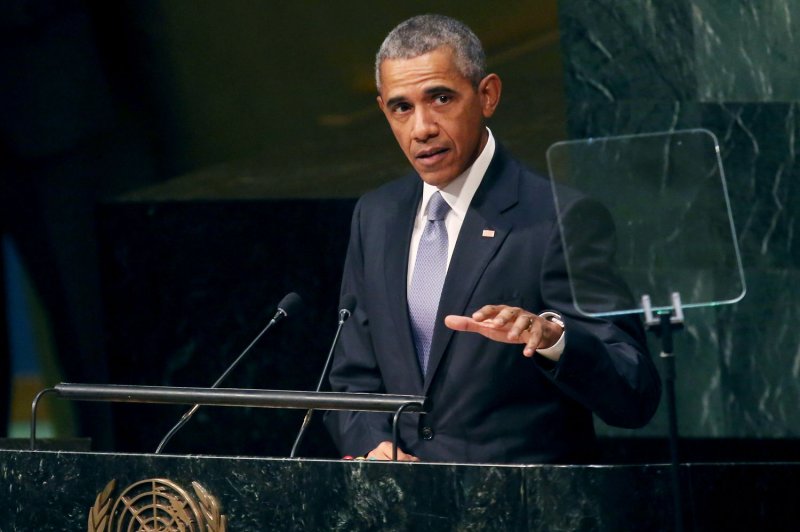1 of 4 | U.S. President Barack Obama addresses the 70th annual United Nations General Assembly on Monday at the U.N. headquarters in New York City. Obama will hold bilateral meetings with Indian Prime Minister Narendra Modi and Russian President Vladimir Putin later in the day. Pool photo by Chip Somodevilla/UPI |
License Photo
NEW YORK, Sept. 28 (UPI) -- U.S. President Obama said he is willing to work with any nation over the Syrian civil war, including Russia and Iran, on Monday during the 70th session of the United Nations General Assembly.
"We will not be outlasted by extremists, but while military power is necessary -- it is not sufficient to resolve the situation in Syria. Lasting stability can only take hold when the people of Syria forge an agreement to live together peacefully," Obama told U.N. members. "The United States is prepared to work with any nation, including Russia and Iran, to resolve the conflict."
He condemned the repression of human rights in the fight against threats to countries, including the "tyrant" Syrian President Bashar al-Assad "who drops barrel bombs to massacre innocent children."
"Assad reacted to peaceful protests by escalating repression and killing that in turn created the environment for the current strife," Obama said referring to the Syrian civil war and the rise of the Islamic State, also known as ISIS, ISIL or Daesh.
Obama reiterated the need for al-Assad's government to be replaced
"We know that ISIL, which emerged out of the chaos in Iraq and Syria, depends on perpetual war to survive, but we also know that they gained adherence because of a poisonous ideology ... part of our job, together, is to work together to reject this extremism," Obama said.
Obama encouraged Muslims to reject the radical Islamist ideology of that preaches intolerance and promotes violence.
"It must also involve a rejection by non-Muslims of the ignorance that equates Islam with terror," Obama added.
"Seventy years after the founding of the United Nations, it is worth reflecting on what together the members of this body have helped to achieve," Obama told U.N. members. "Out of the ashes of the Second World War, having witnessed the unthinkable power of the atomic age, the United States has worked with many nations in this assembly to prevent a third World War."
Obama praised the efforts of the United Nations to improve human development, increase international cooperation and resolve crises, while also reducing poverty, and advancing democracy and individual liberties on "every continent."
"Of course, there have been too many times when collectively we have fallen short of these ideals. Over seven decades terrible conflicts have claimed untold victims, but we have pressed forward -- slowly, steadily -- to make a system of international rules and norms that are better and stronger and more consistent," Obama said.
"Yet we come together today knowing that the march of human progress never travels in a straight line, that our work is far from complete that dangerous currents risk pulling us back into a darker more disordered world," Obama added.
"Strongmen" leaders in charge of fragile states that breed conflict have caused many to flee, and "brutal networks of terror have stepped into the vacuum," Obama said.
Obama also spoke of political polarization by the right and "sometimes" the left that create divisions, such as by "calling for the building of walls to keep out immigrants" in the nature of "a politics of us versus them."
"Most ominously we see the fears of ordinary people being exploited through appeals for sectarianism, or tribalism, or racism, or anti-Semitism," Obama said.
Obama spoke on the "lessons" the United States learned in leading a war in Iraq, stating that hundreds of thousands of troops and billions of dollars spent in the conflict did not establish a stable Iraq.
"The strength of nations depends on the success of their people... and that in turn depends on individual rights and good governance and personal security," Obama said.
Obama is expected to urge the leaders of all 193 U.N. member countries to seek democratic principles, pursue diplomacy, and support established international laws and institutions, while fighting against threats to their countries.
Speakers on Monday include Chinese President Xi Jinping, Iranian President Hassan Rouhani and Egyptian President Abdel Fattah al-Sisi.
Obama will likely address the recent Iranian nuclear deal as an example of international cooperation and principled diplomacy. He will also urge leaders to come together to support a political resolution in Syria, while also coupling military efforts in the fight against the Islamic State.
Cuban President Raul Castro will also speak Monday. The United States and Cuba recently reestablished diplomatic relations after decades of animosity.
The General Debate of the U.N. General Assembly will continue until Friday.















